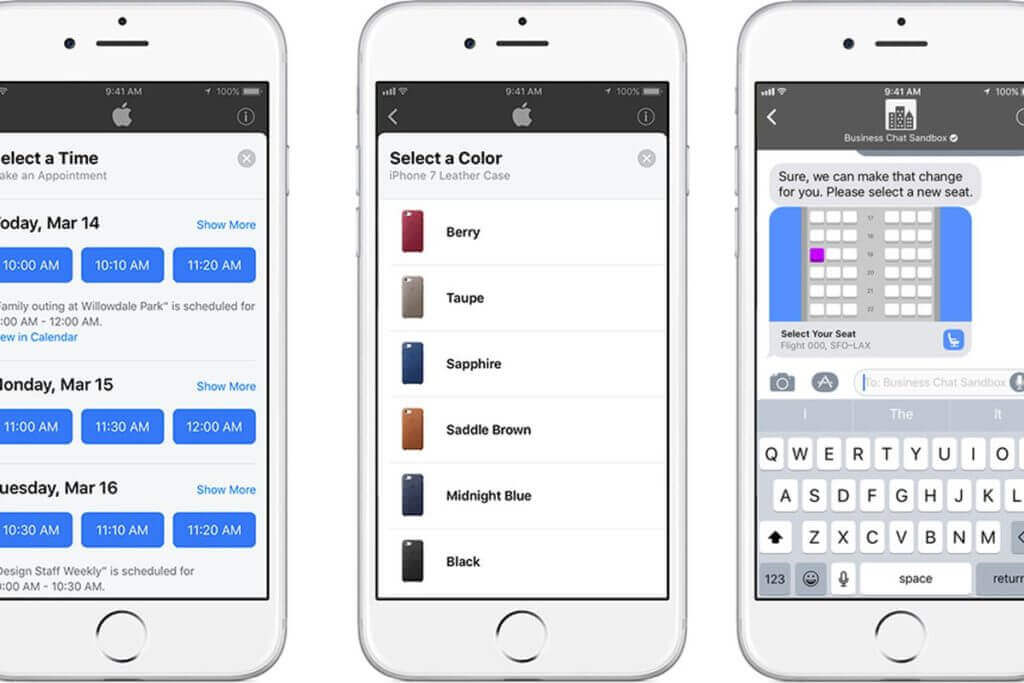
Never one to lag behind, Apple are testing Facebook’s mettle with the launch of their new iMessage integration, Business Chat.
NB: This is an article from TripTease
Apple’s new feature will allow users to open an iMessage window from a variety of different apps and start a conversation with a business. Unlike Facebook Messenger, whose business functionality is centred around chatbots, Business Chat is currently limited to human-to-human conversations. But that doesn’t mean it’s all talk – businesses can also schedule appointments and process payments through their iMessage windows.
So, in an industry in which it’s pretty universally accepted that innovation will be key to keeping up with the OTA-shaped competition, which chat interface is best for your hotel?
Apple vs. Facebook
Well, it kind of depends on your viewpoint. For starters, Business Chat is still a very nascent product: we’re yet to see its full potential, and anyone wishing to work with it right away should be prepared to invest some serious testing and development hours (the public launch isn’t until next year). Messenger, on the other hand, is a well-established force to be reckoned with. Around 1 billion messages are exchanged with businesses on Facebook every month.
At this stage, too, Business Chat predictably only processes payments via Apple Pay – but this is likely to change.
Unlike Messenger, Business Chat doesn’t require you to have a social media presence. Customers can find and communicate with businesses via Maps, Siri, Spotlight, and Safari. We all know that we should be meeting the customer ‘on their own terms’, and it looks like Business Chat is going some way to making this achievable.
Business Chat will also mean your customers can ‘click-to-message’ from a Google search, just as they can currently ‘click-to-call’. There’s potential here to capitalise on the consumer desire for conversation at the SERP level, intercepting the guest with a human interaction before they go to an OTA.
It’s key to note what LivePerson’s Rurik Bradbury describes as ‘Apple’s focus on the human experience’. The launch version of Business Chat features only human-to-human conversations (though this of course could, and probably will, change in the future). The customer also has to initiate the (fully encrypted) conversation.
Facebook Messenger is an impressive piece of kit, with an intuitive back-end platform that meets most needs of the busy hotelier. Given the importance of social media to the traveller journey, it makes sense to be readily available within the world’s biggest platform. There are plenty of integrations available already – Dropbox, for one – and Facebook’s impressive AI is making conversations with chatbots ever more intuitive. Big travel brands like Skyscanner aren’t shying away from Messenger’s potential.
Where Business Chat might set itself apart is its emphasis on ‘real interactions with your customers’. The focus of the launch was very much on the human connection. A neat feature is the ‘chat intent’ functionality: links to Business Chat are tagged, meaning that an employee will know exactly where the customer they’re chatting to has come from and what stage of their journey they were at. There’s more of a context available for a meaningful conversation.
Decision time
If you want an immediate chat platform, use Messenger. But you want to keep an eye on Business Chat in the coming months.
Both solutions are impressive, and both have their limitations. We’re yet to see what Business Chat will achieve. A presence on Messenger is increasingly crucial as consumers continue to engage with a variety of non-traditional platforms on their booking journey. But we’re interested by Apple’s emphasis on the human, and whether hotel brands will take note of the similarities to their own ‘book direct for the human factor’ marketing. Business Chat might open up an interesting space for hotels online – we’re looking forward to seeing how this one plays out.




